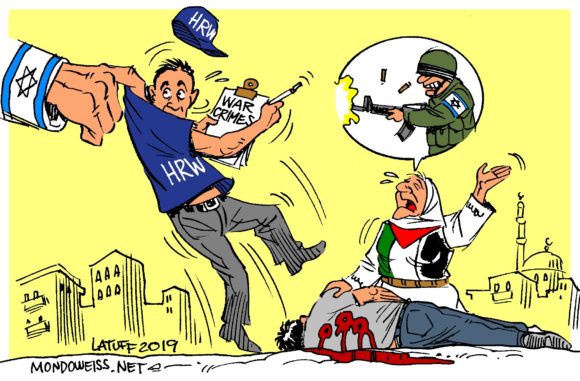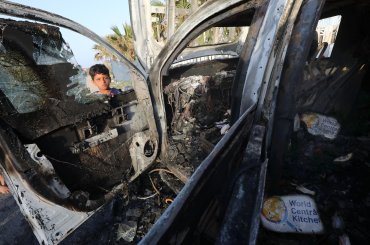It has been a week of appalling abuses committed by Israeli soldiers in the West Bank – little different from the other 2,670 weeks endured by Palestinians since the occupation began in 1967.
The difference this past week was that several entirely unexceptional human rights violations that had been caught on film went viral on social media.
One shows a Palestinian father in the West Bank city of Hebron leading his son by the hand to kindergarten. The pair are stopped by two heavily armed soldiers, there to help enforce the rule of a few hundred illegal Jewish settlers over the city’s Palestinian population.
The soldiers scream at the father, repeatedly and violently push him and then grab his throat as they accuse his small son of throwing stones. As the father tries to shield his son from the frightening confrontation, one soldier pulls out his rifle and sticks it in the father’s face.
חברון היום.
כך נראה כיבוש pic.twitter.com/k9NOHkirmi— Mossi Raz | מוסי רז (@mossi_raz) November 5, 2019
It is a minor incident by the standards of Israel’s long-running belligerent occupation. But it powerfully symbolises the unpredictable, humiliating, terrifying and sometimes deadly experiences faced daily by millions of Palestinians.
A video of another such incident emerged last week. A Palestinian man is ordered to leave an area by an armed Israeli policewoman. He turns and walks slowly away, his hands in the air. Moments later she shoots a sponge-tipped bullet into his back. He falls to the ground, writhing in agony.
הערב במהדורת השבת ב- @newsisrael13 נביא תיעוד בלעדי של אחד מלוחמי מג"ב מבצע ירי בכדור ספוג לעבר פלסטיני שלא מהווה סכנה וידיו באוויר
הפלסטיני שרצה להיכנס לישראל הורחק בידי לוחמי מג"ב ובעודו חוזר לשטחים נורה בגבו ללא כל סיבה ונפצע pic.twitter.com/11A4CrEDhz
— yishai porat – ישי פורת (@yishaiporat) November 2, 2019
It is unclear whether the man was being used for target practice or simply for entertainment.
The reason such abuses are so commonplace is that they are almost never investigated – and even less often are those responsible punished.
It is not simply that Israeli soldiers become inured to the suffering they inflict on Palestinians daily. It is the soldiers’ very duty to crush the Palestinians’ will for freedom, to leave them utterly hopeless. That is what is required of an army policing a population permanently under occupation.
The message is only underscored by the impunity the soldiers enjoy. Whatever they do, they have the backing not only of their commanders but of the government and courts.
Just that point was underlined late last month. An unnamed Israeli army sniper was convicted of shooting dead a 14-year-old boy in Gaza last year. The Palestinian child had been participating in one of the weekly protests at the perimeter fence.
Such trials and convictions are a great rarity. Despite damning evidence showing that Uthman Hillis was shot in the chest with a live round while posing no threat, the court sentenced the sniper to the equivalent of a month’s community service.
In Israel’s warped scales of justice, the cost of a Palestinian child’s life amounts to no more than a month of extra kitchen duties for his killer.
But the overwhelming majority of the 220 Palestinian deaths at the Gaza fence over the past 20 months will never be investigated. Nor will the wounding of tens of thousands more Palestinians, many of them now permanently disabled.
There is an equally disturbing trend. The Israeli public have become so used to seeing YouTube videos of soldiers – their sons and daughters – abuse Palestinians that they now automatically come to the soldiers’ defence, however egregious the abuses.
The video of the father and son threatened in Hebron elicited few denunciations. Most Israelis rallied behind the soldiers. Amos Harel, a military analyst for the liberal Haaretz newspaper, observed that an “irreversible process” was under way among Israelis: “The soldiers are pure and any criticism of them is completely forbidden.”
When the Israeli state offers impunity to its soldiers, the only deterrence is the knowledge that such abuses are being monitored and recorded for posterity – and that one day these soldiers may face real accountability, in a trial for war crimes.
But Israel is working hard to shut down those doing the investigating – human rights groups.
For many years Israel has been denying United Nations monitors – including international law experts like Richard Falk and Michael Lynk – entry to the occupied territories in a blatant bid to stymie their human rights work.
Last week Human Rights Watch, headquartered in New York, also felt the backlash. The Israeli supreme court approved the deportation of Omar Shakir, its Israel-Palestine director.
Before his appointment by HRW, Shakir had called for a boycott of the businesses in illegal Jewish settlements. The judges accepted the state’s argument: he broke Israeli legislation that treats Israel and the settlements as indistinguishable and forbids support for any kind of boycott.
But Shakir rightly understands that the main reason Israel needs soldiers in the West Bank – and has kept them there oppressing Palestinians for more than half a century – is to protect settlers who were sent there in violation of international law.
The collective punishment of Palestinians, such as restrictions on movement and the theft of resources, was inevitable the moment Israel moved the first settlers into the West Bank. That is precisely why it is a war crime for a state to transfer its population into occupied territory.
But Shakir had no hope of a fair hearing. One of the three judges in his case, Noam Sohlberg, is himself just such a lawbreaker. He lives in Alon Shvut, a settlement near Hebron.
Israel’s treatment of Shakir is part of a pattern. In recent days other human rights groups have faced the brunt of Israel’s vindictiveness.
Laith Abu Zeyad, a Palestinian field worker for Amnesty International, was recently issued a travel ban, denying him the right to attend a relative’s funeral in Jordan. Earlier he was refused the right to accompany his mother for chemotherapy in occupied East Jerusalem.
And last week Arif Daraghmeh, a Palestinian field worker for B’Tselem, an Israeli human rights group, was seized at a checkpoint and questioned about his photographing of the army’s handling of Palestinian protests. Daraghmeh had to be taken to hospital after being forced to wait in the sun.
It is a sign of Israel’s overweening confidence in its own impunity that it so openly violates the rights of those whose job it is to monitor human rights.
Palestinians, meanwhile, are rapidly losing the very last voices prepared to stand up and defend them against the systematic abuses associated with Israel’s occupation. Unless reversed, the outcome is preordained: the rule of the settlers and soldiers will grow ever more ruthless, the repression ever more ugly.
A version of this article first appeared in the National, Abu Dhabi.



One of the core tenets of Zionism is the “right” of Jews to do unto others acts of injustice and immorality (“necessary evil”) they would not have others do unto them.
Only an anti-Semite would dare to sentence a Jewish supremacist to a month of extra kitchen duties for doing what is Zionistically “right”.
Some good news:
https://www.theguardian.com/world/2019/nov/12/products-israeli-settlements-labelled-eu-court
“Products from Israeli settlements must be labelled, EU court rules”
“European court of justice says origin must be identified in decision likely to anger Israel”
The Guardian, Nov. 12/19
“The European Union’s top court has ruled that EU countries must identify products made in Israeli settlements on their labels, in a decision welcomed by rights groups but likely to spark anger in Israel.
“The European court of justice said: ‘Foodstuffs originating in the territories occupied by the state of Israel must bear the indication of their territory of origin.’
“The Luxembourg-based court said the labelling of products from Israeli settlements must provide an ‘indication of that provenance’ so consumers could make ‘informed choices’ when they shopped.
“The EU has consistently spoken out against Israeli settlement expansion, saying it undermines the hopes for a two-state solution by gobbling up lands claimed by the Palestinians. Israel says the labelling is unfair and discriminatory and that other countries involved in disputes over land are not treated the same way.
“The EU wants any produce made in the settlements to be easily identifiable to shoppers and insists they should not carry the generic ‘Made in Israel’ tag.
“Israel captured the West Bank and East Jerusalem in the 1967 Middle East war and began settling both areas shortly afterwards. The Palestinians claim both areas as parts of a future state, a position that has global support.
“The international community opposes settlement construction and many countries consider them illegal. Their continued growth is seen to undermine the establishment of an independent Palestine alongside Israel. Today, nearly 700,000 Israelis – almost 10% of the country’s Jewish population– live in the two areas.
“The ECJ underlined that settlements ‘give concrete expression to a policy of population transfer conducted by that state outside its territory, in violation of the rules of general international humanitarian law.’
“It said any failure to identify the point of origin of produce meant that ‘consumers have no way of knowing, in the absence of any information capable of enlightening them in that respect, that a foodstuff comes from a locality or a set of localities constituting a settlement established in one of those territories in breach of the rules of international humanitarian law.’
“Human Rights Watch welcomed the ruling. Lotte Leicht, the watchdog’s EU director, said it was ‘an important step toward EU member states upholding their duty not to participate in the fiction that illegal settlements are part of Israel. European consumers are entitled to be confident that the products they purchase are not linked to serious violations of international humanitarian law.’
“In Israel, Prof Eugene Kontorovich, the director of international law at the Jerusalem-based Kohelet Policy Forum, said the European court was ‘approving putting a new kind of yellow star on Jewish-made products.’
“’This blatant discrimination makes it more urgent than ever for the Trump administration to defy Brussels by making official what has long been US practice, to allow these products to be labelled ‘Made in Israel’, said Kontorovich.
“It is not entirely clear how the ruling will be enforced. European retailers would normally be expected to add the labelling, but the real origin of the produce is not always easy to identify, experts say.
“The case came to court after an Israeli winery based in a settlement near Jerusalem contested France’s application of a previous ECJ court ruling on the labelling. That ruling backed the use of origin-identifying tags but did not make them legally binding.
“The winery and Israel’s foreign ministry had no immediate comment on the ruling.”
Young American Jews join hands with the Palestinians:
https://www.amherstbulletin.com/Guest-column-Eliza-Clark-30086114
“WMass Jewish Voice for Peace denounces chancellor’s BDS statement” Amherst Bulletin, Nov. 9/19, by Judy Frank,
“Western Mass Jewish Voice for Peace would like to officially extend our full support and solidarity to the Media Education Foundation, directed by UMass Professor of Communication Sut Jhally, to the UMass Chapter of Students for Justice in Palestine, to all Palestinian students, faculty and staff on campus.
“We denounce the recent statement issued by UMass Chancellor Kumble Subbaswamy regarding the upcoming Nov. 12 event, ‘Criminalizing Dissent: The Attack on BDS and American Democracy.’ We are appalled that the chancellor would condemn the event as polarizing and one-dimensional, inciting the very backlash that the movement for Boycott, Divestment, and Sanctions for Palestinian rights so often faces.
“Chancellor Subbaswamy’s statement does not in fact promote a climate of tolerance and dialogue, but instead contributes to the racist and Islamophobic harassment and intimidation that Palestinian students and community members routinely face for speaking out in favor of BDS.
“In his statement, Subbaswamy endorses the false claim that the Palestinian call for BDS is anti-Semitic, and claims that this event will alienate or offend Jewish students. As the Western Mass chapter of Jewish Voice for Peace, we strongly disagree. As Jews, we are intimately familiar with anti-Semitism. We live with the trauma and fear caused by anti-Semitism every day.
“Accusations that the movement for BDS is anti-Semitic and alienates Jews only serve to trivialize and obscure very real anti-Semitism, which comes from white nationalists, as we have seen with the shootings at the Tree of Life Congregation in Pittsburgh and the Poway Synagogue in San Diego, and at UMass, where swastikas were found defacing buildings on campus.
“It is deeply harmful to the Jewish community when anti-Palestinian activists weaponize our trauma to marginalize BDS advocates and Palestinians. To insinuate that BDS is anti-Semitic is to insinuate that Israel’s illegal occupation of Palestinian land, human rights violations and apartheid are Jewish values. They are not.
“We support BDS — a non-violent, constitutionally-protected and time-honored method of protest called for by Palestinian civil society — because our Jewish values and history have taught us that we cannot be neutral in the face of injustice. It is our duty to stand in solidarity with our Palestinian comrades in their struggle for liberation and peace.
“Jews who criticize Israel and its policies harming Palestinians are a key part of the Jewish community at UMass and beyond. We will not allow our voices to be erased as a means of silencing activists for Palestinian rights.
“In support of his statement, the chancellor ironically relies on the value of inclusion, a value we wholeheartedly support. Yet, by giving institutional imprimatur to the problematic anti-Palestinian characterizations of BDS, he has spoken loud and clear about who on campus is deemed worthy of support and protection and who is not.
“The chancellor called the event ‘the antithesis of our commitment to inclusion,’ and pointed campus members to support services including the Office of Religious and Spiritual Life, the Center for Counseling & Psychological Health, and UMass Hillel.
“Where is the concern for the mental health of Palestinians who are often traumatized from living under occupation? Where are the counseling and support services for Palestinian students, organizers and community members when they are faced with backlash?
“For a stark comparison, we note that Benny Morris, a known Islamophobe who has openly argued in favor of ethnic cleansing of Palestinians and Arab citizens of Israel, recently spoke at UMass, at an event sponsored by four UMass departments. Chancellor Subbaswamy made no such ideological condemnation of that event, nor did he clarify that Mr. Morris’ widely criticized viewpoints are not shared by the university, nor did he appoint Palestinian students to support services on campus.
“If UMass truly seeks to establish itself as an inclusive, anti-racist institution, it must welcome and support colonized peoples (such as Palestinians) organizing for their autonomy and dignity, including through non-violent boycotts like BDS. As Jewish members of UMass Amherst and the broader community, we demand nothing less.”